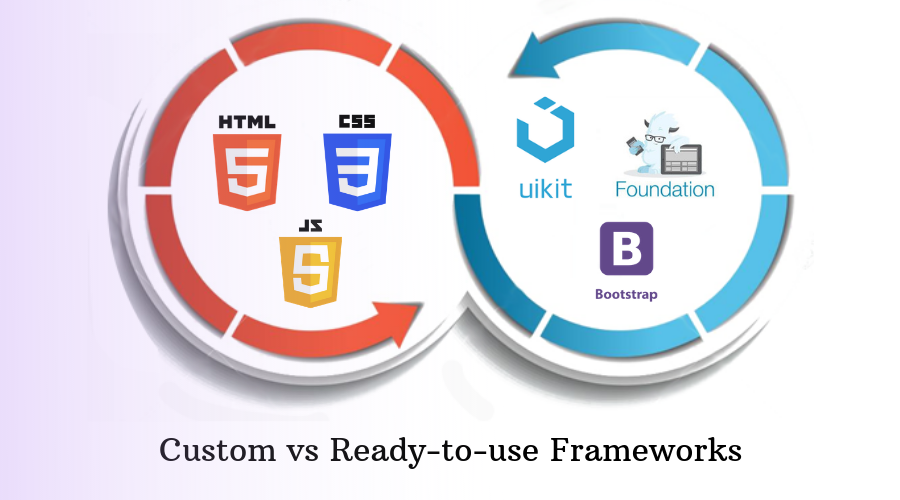The confusion to choose custom code vs ready-to-use frameworks is a never-ending argument. In this blog post, we’re going to explore the advantages and disadvantages of custom and ready-to-use frameworks, which will help you to take the correct decision to choose between them.
Front-end development is a process, in which, a developer implements web designs through coding languages like HTML5, CSS3, JavaScript, etc. An ideal front-end framework allows you to quickly produce prototypes to speed up the overall design and development process.
Front-end frameworks simplify, streamline and speed up the website design and development process. The main objective of front-end development is to ensure that when the target users open up the site, they see the information in a format, which is easy to read and understand.
Custom code is a real-time coding, in which developer customizes the coding as per the given designs and format. While a ready-to-use framework is a ready-made collection of themes and features. It reduces the time and effort of the developers as compared to custom code.
So, custom code vs ready-to-use framework has become the most popular debate in recent times. This sometimes makes the business highly confused. And they face quite a difficulty in opting for the right option for their project development.
Is Ready-to-Use Framework Better than Custom Code?
It is hard to say, which one is better because both are excellent at their place. Custom code is very secure and reliable and perfect for each and every project. Weather, Ready-to-use framework is pre-designed themes and features, which take less time for the implementation during the development.
Differences Between Custom Code and Ready-to-Use Framework:
Custom Code
Custom code is a process, in which a developer implements the designs as per the requirements of the project. A custom code development saves your time, effort and money, in the long run since it accommodates your long term needs.
Custom code is used to connect two systems together, which is called ‘point-to-point integration’. It provides quick and easy communication between data.
You may also like to read: WordPress Vs Static HTML – Which one is Better for Your Website?
Advantages of Custom Code
- The developer can integrate features and codes to your product, according to your requirements.
- It minimizes the use of third party components and add-ons and includes only what you need for your website.
- Custom code is flexible and compatible with all the latest browsers.
- Despite the initial extra work and maintenance; this process will teach a lot and will also improve the handling skill.
- The developer can also create unique themes on their own as per the selected framework for your website.
Disadvantage of Custom Code
- It takes time and effort initially to built-up.
- It needs to test and optimize the code with search engines like Google.
- After coding, it is compulsory to check and fix the bugs to run the website smoothly.
- To make a small change on your website, you need to hire a professional developer.
Ready-to-Use Framework
The ready-to-use framework, as the name suggests, offers ready-made themes and designs in the front-end development.
Advantages of Ready-to-Use Framework
- This framework solves every single problem for every single situation.
- It takes less time and effort to implement. A non-technical or a decent knowledge is enough to build a good-looking and multi-functional website.
- You will get regular updates and new features to make your website up-to-date. It increases the performance of your website.
- The ready-to-use framework is very useful because it is well tested and has a nice configuration to customize as per your project.
- It comes with all the latest and best code as per the chosen platform.
Disadvantage of Ready-to-Use Framework
- If you upgrade any applied themes and features, then it can also affect the coding.
- It is difficult to find and style the appropriate CSS to match the given designs.
- In the ready-to-use framework, developers can use the same theme in multiple projects; there is no security or privacy in this framework.
- It requires a complex coding to accommodate all the attributes and variables of coding into your website.
Conclusion
Now, we have already discussed the advantages and disadvantages of both custom code and ready-to-use framework. So, it’s expected that you may have some ideas about the right option for your next project. All you need to do is to analyze your business requirements and proceed accordingly, to make the right selection between these two.
We would love to here your comments & questions about this blog post. Send us your thoughts by completing the contact form.










